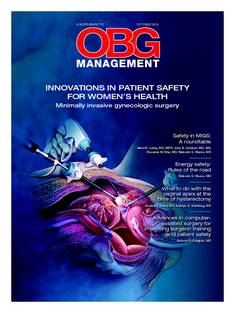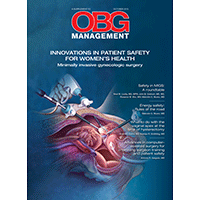User login

Click here to download the PDF.
Every surgeon knows that, if you operate, complications will follow. Surgeons are perfectionists and strive to reduce complications through years of diligent personal training and continuous quality improvement. Surgeons hate complications, especially those that might be preventable (such as retained foreign bodies, wrong site surgery, and medication errors).
In this special issue of OBG Management, world-renowned experts focus on topical issues in safety in minimally invasive gynecologic surgery (MIGS). In a roundtable, Drs. Neal Lonky, John Gebhart, Rosanne Kho, and Malcolm Munro discuss important issues in MIGS, including the need to prioritize the vaginal and laparoscopic routes of hysterectomy and the role of single-port surgery. In a concise yet detailed discussion of safety issues related to radiofrequency and ultrasound energy devices, Dr. Munro alerts us to the dangers of heat injury and direct and capacitative coupling. Drs. Andrew Sokol and Katelyn Smithling provide guidance on preventing apical prolapse of the vagina following hysterectomy. And Dr. Antonio Gargiulo explores the rapidly expanding role of simulation training with computer-assisted (robotic) surgical simulators and predicts that, instead of learning surgery on patients, future trainees will gain skills in a simulation environment.
We thank the master surgeons who participated in this special issue for providing guidance and helping us to reduce complications. Our patients are the beneficiaries of the wisdom provided herein.
>>Robert L. Barbieri, MD
Editor in Chief, OBG Management
To view the video, "McCall" culdoplasty technique by Mickey Karram, MD, that accompanies the article by Sokol et al in this supplement, click here.

Click here to download the PDF.
Every surgeon knows that, if you operate, complications will follow. Surgeons are perfectionists and strive to reduce complications through years of diligent personal training and continuous quality improvement. Surgeons hate complications, especially those that might be preventable (such as retained foreign bodies, wrong site surgery, and medication errors).
In this special issue of OBG Management, world-renowned experts focus on topical issues in safety in minimally invasive gynecologic surgery (MIGS). In a roundtable, Drs. Neal Lonky, John Gebhart, Rosanne Kho, and Malcolm Munro discuss important issues in MIGS, including the need to prioritize the vaginal and laparoscopic routes of hysterectomy and the role of single-port surgery. In a concise yet detailed discussion of safety issues related to radiofrequency and ultrasound energy devices, Dr. Munro alerts us to the dangers of heat injury and direct and capacitative coupling. Drs. Andrew Sokol and Katelyn Smithling provide guidance on preventing apical prolapse of the vagina following hysterectomy. And Dr. Antonio Gargiulo explores the rapidly expanding role of simulation training with computer-assisted (robotic) surgical simulators and predicts that, instead of learning surgery on patients, future trainees will gain skills in a simulation environment.
We thank the master surgeons who participated in this special issue for providing guidance and helping us to reduce complications. Our patients are the beneficiaries of the wisdom provided herein.
>>Robert L. Barbieri, MD
Editor in Chief, OBG Management
To view the video, "McCall" culdoplasty technique by Mickey Karram, MD, that accompanies the article by Sokol et al in this supplement, click here.

Click here to download the PDF.
Every surgeon knows that, if you operate, complications will follow. Surgeons are perfectionists and strive to reduce complications through years of diligent personal training and continuous quality improvement. Surgeons hate complications, especially those that might be preventable (such as retained foreign bodies, wrong site surgery, and medication errors).
In this special issue of OBG Management, world-renowned experts focus on topical issues in safety in minimally invasive gynecologic surgery (MIGS). In a roundtable, Drs. Neal Lonky, John Gebhart, Rosanne Kho, and Malcolm Munro discuss important issues in MIGS, including the need to prioritize the vaginal and laparoscopic routes of hysterectomy and the role of single-port surgery. In a concise yet detailed discussion of safety issues related to radiofrequency and ultrasound energy devices, Dr. Munro alerts us to the dangers of heat injury and direct and capacitative coupling. Drs. Andrew Sokol and Katelyn Smithling provide guidance on preventing apical prolapse of the vagina following hysterectomy. And Dr. Antonio Gargiulo explores the rapidly expanding role of simulation training with computer-assisted (robotic) surgical simulators and predicts that, instead of learning surgery on patients, future trainees will gain skills in a simulation environment.
We thank the master surgeons who participated in this special issue for providing guidance and helping us to reduce complications. Our patients are the beneficiaries of the wisdom provided herein.
>>Robert L. Barbieri, MD
Editor in Chief, OBG Management
To view the video, "McCall" culdoplasty technique by Mickey Karram, MD, that accompanies the article by Sokol et al in this supplement, click here.
